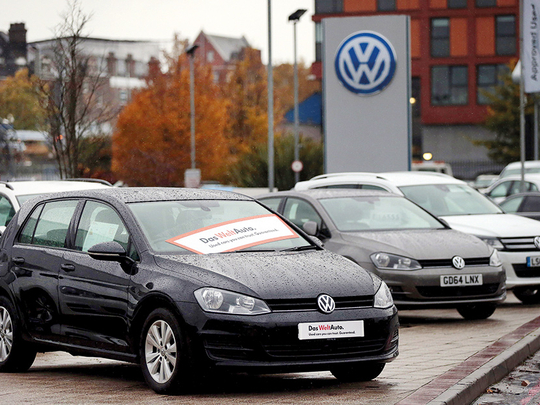
Frankfurt
Volkswagen has vowed to be the company that will make electric cars affordable for the masses. But an earnings report shows how the cost of an emissions scandal could interfere with those plans.
Net profit in the third quarter fell about 50 per cent, to 1.1 billion euros, after the company set aside 2.6 billion euros (Dh9.55 billion) to cover the unexpectedly high cost of repairing diesel cars in the US that contained illegal, emissions-cheating software. The automaker had warned last month that the emissions scandal would cut into earnings.
One way that Volkswagen was able to still report a profit in the quarter, though, was by cutting spending on research and development. That may not be a wise strategy during what Matthias Müller, chief executive of Volkswagen, described in a statement as a “profound structural transformation” in the auto industry.
Traditional car companies are spending heavily to develop battery powered and self-driving cars, while still maintaining their line-ups of cars with internal combustion engines. Supporting both old and new technologies is expensive, and puts companies like Volkswagen, Ford or General Motors at a disadvantage compared to new companies like Tesla, which builds only electric vehicles.
Volkswagen has announced ambitious plans to offer a line-up of battery-powered vehicles beginning in late 2019 that would be affordable for middle-class buyers. Herbert Diess, the head of the division that makes Volkswagen brand cars, has said that he sees Tesla as a more important competitor than traditional rivals like Toyota.
The German company aims to deploy its enormous manufacturing network to churn out battery-powered cars faster, and in greater volumes, than Tesla, which has had trouble meeting demand. But those plans may be difficult to reconcile with cuts in the research and development budget.
The diesel scandal remains a dead weight on the company’s finances and reputation. Volkswagen said that legal settlements and other costs related to the emissions cheating have drained 14.5 billion euros this year from company coffers. That is money that Volkswagen would certainly prefer to spend developing new products.
Volkswagen might be able to find savings in other areas, for example, by diverting money that could have been used to develop new diesel engines, said Stefan Bratzel, director of the Center of Automotive Management at the Fachhochschule der Wirtschaft, a technical university in Bergisch Gladbach, Germany.
Still, Bratzel said, “it really hurts that this money is gone and is not available for the future.”
The damage from the scandal, Volkswagen said in a statement, was “nowhere near an end and would continue to necessitate great efforts throughout the entire group.”
Andreas Hoffbauer, a Volkswagen spokesman, said the company was responding to investors who have long complained that the research and development budget was spent inefficiently and was too large compared to rivals’ budgets. The good news for the carmaker was that sales in the third quarter rose 6 per cent, to 55 billion euros, thanks in part to a new SUV model introduced in the US and economic recovery in Latin America.
The company acknowledged in the earnings report that one reason for the mediocre performance in Europe was “the fact that customer confidence has not yet been fully restored following the diesel issue and to customer uncertainty generated by the public discussion on driving bans for diesel vehicles.”
London’s city government began imposing a daily charge of £10 (Dh48.54), on older diesel cars to drive in the city center, on top of the existing congestion charge of 11.50 pounds per day. Other cities like Stuttgart and Munich are also considering restrictions on diesels, which are blamed for high levels of harmful nitrogen oxides.
In a positive development, Volkswagen made more money from its namesake brand than it did last year. Operating profit from cars with the VW logo doubled to 2.5 billion euros in the first nine months of 2017 compared to the same period a year earlier. But the company remains dependent on its luxury brands Audi and Porsche, which generated more than twice as much profit, even though they sell fewer cars.
Audi sales have slipped this year, also an ominous sign.
— New York Times News Service












